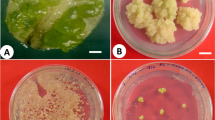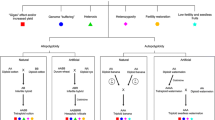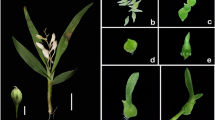Abstract
Random amplified polymorphic DNA (RAPD) markers were used to determine the genetic stability of long-term (more than 10 years) micropropagated shoots of Japanese black pine (Pinus thunbergii Parl.). Thirty-six shoots consisting of three morphotypes (short, medium, and long needles) were randomly chosen from about 4,000 micropropagated shoots regenerated from the explants of a single nematode-resistant mother plant. Out of 126 primers screened, 30 gave 134 clear reproducible bands. A total of 4,824 bands obtained from these studies exhibited no aberration in RAPD banding patterns among the tested shoots. Our results show that regenerants from our plant micropropagation system are genetically stable.
Similar content being viewed by others
Author information
Authors and Affiliations
Additional information
Received: 5 December 1997 / Revision received: 17 May 1998 / Accepted: 1 June 1998
Rights and permissions
About this article
Cite this article
Goto, S., Thakur, R. & Ishii, K. Determination of genetic stability in long-term micropropagated shoots of Pinus thunbergii Parl. using RAPD markers. Plant Cell Reports 18, 193–197 (1998). https://doi.org/10.1007/s002990050555
Issue Date:
DOI: https://doi.org/10.1007/s002990050555




